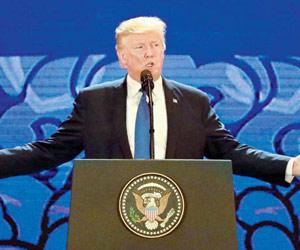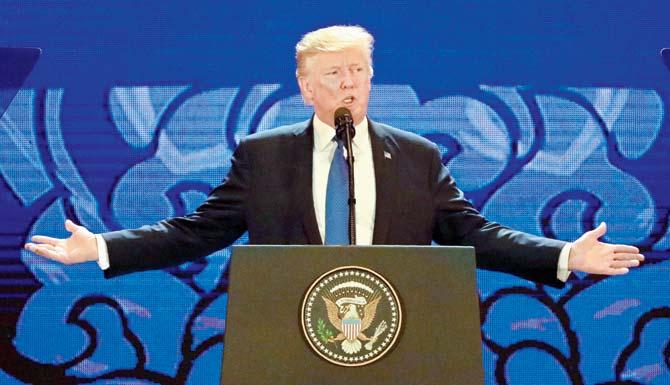The Supreme Court has allowed the third version of President Donald Trumps executive order to ban residents of eight countries including six Muslim-majority nations, from travelling to the US while legal challenges against it continue, media reports

The Supreme Court has allowed the third version of President Donald Trumps executive order to ban residents of eight countries including six Muslim-majority nations, from travelling to the US while legal challenges against it continue, media reports said. Issued in September, the third edition of the travel ban placed varying levels of restrictions on foreign nationals from the eight countries: Chad, Iran, Libya, North Korea, Syria, Venezuela, Somalia and Yemen, reports CNN.This is the first time justices have allowed any edition of the ban to go forward in its entirety. In unsigned orderd on Monday that did not disclose the Supreme Court's reasoning, the justices lifted the injunctions, which had been issued by federal judges in Hawaii and Maryland. The court's orders mean that the administration can fully enforce its new restrictions on travel from the eight nations, reports The New York Times. The restrictions vary in their details, but in most cases, citizens of the countries will be unable to emigrate to the US permanently and many will be barred from working, studying or vacationing here.
ADVERTISEMENT

US President Donald Trump Pic/AFP
Iran, for example, will still be able to send its citizens on student exchanges, though such visitors will be subject to enhanced screening. Somalis will no longer be allowed to emigrate to the US, but may visit with extra screening. The Supreme Court's orders effectively overturned a compromise in place since June, when it said that travellers with connections to the US could continue to travel here notwithstanding restrictions in an earlier version of the ban. Attorney General Jeff Sessions called the order "a substantial victory for the safety and security of the American people". A spokesman for the White House, Hogan Gidley, said: "We are not surprised by today's Supreme Court decision," calling it "lawful and essential to protecting our homeland". Meanwhile, challenges against the travel ban will continue this week on both coasts, reports CNN. In the Hawaii case, a district court judge blocked the ban from going into effect except as it pertains to Venezuela and North Korea. But a three-judge panel of the San Francisco-based 9th US Circuit Court of Appeals partially lifted that order.
The appeals court allowed the ban to go into effect except for foreign nationals who have "bona fide" relationships with people or entities in the US. The language of the order was adopted from a Supreme Court order pertaining to an earlier version of the ban. Neal Katyal, representing Hawaii, had urged the justices to leave the lower court's ruling -- that echoed the justices' own words from the previous case -- intact. In a separate challenge out of Maryland brought by, among others, the International Refugee Assistance Project, US District Court Judge Theodore D. Chuang issued a similar order also partially enjoining the ban in a case that is now pending before the Fourth Circuit Court of Appeals. Both cases are scheduled to be heard before the appeals courts on Wednesday and Friday.
Catch up on all the latest Mumbai, National and International news here
Download the new mid-day Android and iOS apps to get updates on all the latest and trending stories on the go
 Subscribe today by clicking the link and stay updated with the latest news!" Click here!
Subscribe today by clicking the link and stay updated with the latest news!" Click here!







